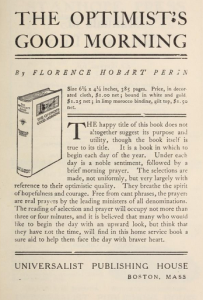“I will pray for you” and its secularized version “I’m thinking of you” are still lively expressions of concern, and often deeply valued by the person thought of or prayed for. Friends have approached me, asking for prayer, only last week.
“Of course,” I said. And I mean it, and I have a plan to fulfil that request. I will pray for you.
There’s a technique to adding petitions to collects. To review, collects (accent on the first syllable) are a variety of prayer with a particular structure, and they are typically prayed in a set series, with special collects added for particular occasions. In the morning and evening prayer the Universalists historically used, the collects come at the end. The collect “for all Conditions of Men” is a good place to add petitions, so I’ll show it as printed, and then as I pray it. Prayers for clergy and congregations (I always pray for my ministers and church, for what it’s worth), for this and other nations, for special occasions, and my blessings in this life come in other places.
As printed:
O God, the Creator and Preserver of all mankind, we humbly beseech thee for all sorts and conditions of men; that thou wouldest be pleased to make thy ways known unto them, thy saving health unto all nations. More especially we pray for the good estate of the Church Universal; that it may be so guided and governed by thy good Spirit, that all who profess and call themselves Christians may be led into the way of truth, and hold the faith in unity of spirit, in the bond of peace, and in righteousness of life. Finally, we commend to thy fatherly goodness all those who are any ways afflicted or distressed, in mind, body, or estate; that it may please thee to comfort and relieve them according to their several necessities, giving them patience under their sufferings, and a happy issue out of all their afflictions. And this we beg for thy mercy’s sake in Jesus Christ our Lord. Amen.
How I pray it today:
O God, the Creator and Preserver of all mankind, we humbly beseech thee for all sorts and conditions of
men; that thou wouldest be pleased to make thy ways known unto them, thy saving health unto all nations. More especially we pray for the good estate of the Church Universal; and in particular the churches in Iraq, that it may be so guided and governed by thy good Spirit, that all who profess and call themselves Christians may be led into the way of truth, and hold the faith in unity of spirit, in the bond of peace, and in righteousness of life. Finally, we commend to thy fatherly goodness all those who are any ways afflicted or distressed, in mind, body, or estate; particularly Anna, Bailey and Carter; the refugees in Syria and Gaza; and people suffering with bulimia that it may please thee to comfort and relieve them according to their several necessities, giving them patience under their sufferings, and a happy issue out of all their afflictions. And this we beg for thy mercy’s sake in Jesus Christ our Lord. Amen.
The semicolons are your friends. Added petitions seem to fit there naturally, or at the end of sentences. I’ll later share some resources about finding additional, particular (“proper”) collects.


